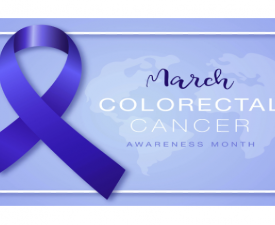What You Need to Know About Colorectal Cancer Screening
March 9, 2021
March is Colorectal Cancer Awareness Month.
Colorectal cancer is the third-leading cause of cancer deaths in the United States.

Awareness campaigns for the disease are designed to increase the public’s awareness of risk factors for colorectal cancer and screenings available to detect the cancer at an earlier and more treatable stage. The overall death rate for colorectal cancer has been steadily declining for the past several decades, thanks in part to increases in screening for the disease.
The U.S. Preventive Services Task Force (USPSTF) recommends that all men and women between the ages of 50 and 75 be screened for colorectal cancer.
Additionally, the USPSTF states that people between 76 and 85 years of age should follow their physician’s guidance regarding whether or not they should be screened for the disease.1 The American Cancer Society recently updated its recommendation for colorectal cancer screening, specifying that screenings should begin at age 45 years for people with an average risk for the disease. This update reflects the increasing number of colorectal cancer cases in people under the age of 50.2 People that have a family history of colorectal cancer or a hereditary cancer syndrome may need to start screening at an earlier age.
Stool-based tests and/or visual exams are used for colorectal cancer screening.
Many people are familiar with the visual exams used to screen for colorectal cancer: Colonoscopies use a long, thin, flexible tube to examine the entire colon, and flexible sigmoidoscopies, which are similar to colonoscopies, examine only the lower one-third of the colon. The CT colonography, or virtual colonoscopy, is another visual exam used to inspect the inside of the colon. Visual exams require the patient to use laxatives to clean out the colon prior to the procedure, and patients will require anesthesia for a colonoscopy. The guaiac-based fecal occult blood test (gFOBT) and the fecal immunochemical test (FIT) are both stool-based tests that detect blood in stool samples. The FIT-DNA test is a stool-based test that combines the FIT with another test that detects altered DNA from cells in a bowel movement.
How often you need to be screened for colorectal cancer depends on your risk level and which screening test(s) are used.
People with an average risk for colorectal cancer need to be screened every ten years if they undergo a colonoscopy or every five years with a flexible sigmoidoscopy. If a patient receives a FIT every year, the same patient can go ten years between flexible sigmoidoscopy screenings. CT colonography must be repeated every five years.3 If a patient is screened with only a FIT or gFOBT, testing should be repeated every one to two years.4 The FIT-DNA test is usually performed every three years.3 Screenings will likely occur more frequently for patients that have a higher-than-average risk of developing colorectal cancer.
Colorectal cancer screening is effective.
Screening colonoscopies were associated with a 65% decrease in the risk of death for colorectal cancers occurring in the right colon and a 75% decrease in the risk of death for cancers of the left colon and rectum.5
Visual colorectal cancer exams are performed at a doctor’s office or hospital.
Stool-based tests for colorectal cancer screening are performed at home. A stool sample is collected and sent to a lab for testing. Flexible sigmoidoscopy, colonoscopy and CT colonography are performed either at a doctor’s office or a hospital.
Many fewer colorectal cancer screenings occurred during 2020 as a result of the pandemic.
For example, San Francisco Health Network in-person primary care clinic visits dropped 70% between February 2020 and May 2020 due to the COVID-19 pandemic. This resulted in a corresponding decrease in the number of colorectal cancer screenings performed in the Network: The number of FITs performed between February 2020 and April 2020 decreased by 85%, and the number of colonoscopy exams decreased by 90% during the same time frame. If these trends continued through early June 2020, estimates suggest that almost 19,000 colorectal cancer diagnoses will be missed and over 4,000 excess deaths will occur from the cancer nationally.6
Some hereditary cancer syndromes, which are caused by an adverse gene change (mutation) that can be passed from an affected parent to their child, are known to increase an individual’s risk of developing colorectal cancer. Comprehensive hereditary cancer screenings, such as Kailos Genetics’ ExpedioTM Hereditary Cancer Screening, test multiple genes for mutations associated with an increased risk of developing colorectal and other types of cancer. Importantly, these screenings allow patients and their physicians to proactively mitigate cancer risk based on the patient’s specific mutation. Click here to learn more about ExpedioTM or contact us with any questions you may have regarding genetic screenings.




